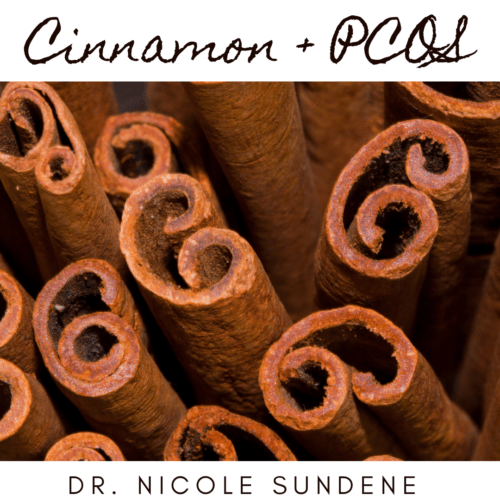
Dr. Nicole Sundene
Why is cinnamon one of my favorite herbs as a Naturopathic Hormone Doctor you ask? Cinnamon is not only super effective, but most women find it a delicious herb to incorporate in their daily diet. Today I will go over the latest women’s health research on cinnamon, and how to use cinnamon as a tea and in foods.
The most important condition I think of using cinnamon for is PCOS. As cinnamon is one of the most helpful herbs for PCOS, especially when it is the insulin resistant or “metabolic type” as I discuss on my PCOS blog.
Exciting new research shows diabetes and peripheral neuropathy pain improve with cinnamon! Cinnamon actually helps regenerate nerve damage [11].
CINNAMON’S LATEST RESEARCH:
Cinnamon research demonstrates benefit in Type 2 Diabetes, PCOS, Migraines, Cramps, improved nerve damage in Peripheral Neuropathy, and improved pain [1-11]. Cinnamon aromatherapy actually helped newborns in the ICU go home an average of 3-4 days sooner [12].
Diabetes: Researchers found that only 500mg of daily cinnamon was needed to improve Type 1 Diabetes [1, 7]. This is fantastic because I have most of my diabetics taking 2 x 500mg capsules of cinnamon twice daily with meals and see this dose helping lower the need for Metformin. Some can’t handle taking that much as I discuss in the contraindication section further, so it is amazing to know that even one capsule daily provides benefits!
Most capsules of herbal medicine are 500mg. Most of the research studies cited here were done with 500mg capsules. Make sure you check the product you are using so you know the dose and then always stick with the same brand to avoid dose variations especially for those with diabetes and high blood pressure relying on cinnamon as medicine. You don't want to unwittingly increase or decrease your dose of cinnamon. Check out my Diabetes Diet for more tips.
I immediately prescribe 1000mg of cinnamon twice daily with meals to all of my diabetic patients and ask them to take as much as they can tolerate with food. Cinnamon is nature’s metformin and it works beautifully to support the pancreas and help stabilize blood sugar. With stable blood sugar my diabetics can mentally make healthier choices and have less episodes of low blood sugar causing them to crave carbs and fall off their diet.
PCOS: Three x 500mg capsules of cinnamon daily were beneficial for both PCOS and Insulin Resistance [2]. In another study, 1500mg of cinnamon not only improved PCOS symptoms but also lowered insulin and cholesterol [17].
An herbal formula containing 1) Cinnamon 2) Licorice 3) Flaxseed 4) Vitex was found beneficial for improving menstrual flow in PCOS patients better than metformin [10].
Migraines: Cinnamon is commonly used to treat pain. Researchers studied fifty patients with migraine headaches given cinnamon, and found cinnamon to be beneficial for migraines [3].
Cramps: Hooray! Researchers found that “cinnamon can reduce the intensity of primary dysmenorrhea” or painful cramps. Cinnamon was given at onset of cycle for 72 hours for 2 cycles and found helpful [5].
Peripheral Neuropathy Pain: Cinnamon improved nerve damage in peripheral nerves [11]. Research demonstrated that cinnamon positively affects peripheral nerve restoration! Another study demonstrated it's ability to heal the sciatic nerve after crush injury [16]. This is amazing news for those with peripheral neuropathy from diabetes, long covid, or other causes. Unlike the central nervous system, the peripheral nervous system can actually heal and repair when we add herbal medicine and remove the “Obstacles to Cure” and address the “Root Cause."
Thrush: Cinnamon was found beneficial as a treatment against thrush and yeast species [4].
Nasal Spray: I fear to discuss this cinnamon nasal spray research and pray children on social media will not change the “Cinnamon Challenge” from eating cinnamon to snorting cinnamon! But, since the research found cinnamon beneficial I will share that intranasal cinnamon solution improved seasonal allergies [6]. Keep in mind this was a nasal solution of cinnamon and nobody was snorting straight cinnamon!
Because cinnamon is anti-inflammatory, antiviral, and antifungal I would be excited to see a commercially available cinnamon nasal spray to help prevent and treat chronic sinusitis. Especially for allergy sufferers as oftentimes seasonal allergies inflame the tissues and thus increase risk of infection.
Bladder Pain: Cinnamon applied over the bladder as a patch was found beneficial for reducing bladder pain in those with "Overactive Bladder" [13].
Lip Plumper: Cinnamon when combined with menthol and capsaicin was found to be a safe and effective lip plumper [14].
Mouth Ulcers: Cinnamon was an effective topical agent for mouth ulcers or apthous stomatitis [15].
Cinnamon Safety Research: Cinnamon was found to be extremely safe by researchers that concluded they found no significant side effects or toxicity with cinnamon including “hepatoxoxicity or anti-coagulation properties” [8] Meaning cinnamon is non-toxic, and does not actually interfere with blood thinning medications. Cinnamon was also found not to cause electrical changes to the heart via ECG [17].
Researchers also concluded no side effects for cinnamon at doses that also “demonstrated anti-hyperlipidemic and blood pressure lowering effects among healthy adults” [9]
So cinnamon is generally safe and non-toxic at therapeutic doses, while working to lower both cholesterol and blood pressure. Considering how effective cinnamon is for diabetes it should be considered as a first line treatment doctors can trust when treating diabetes, cramps, high cholesterol, seasonal allergies, thrush, and peripheral neuropathy. Especially in a mild range where diet and exercise may be sufficient to control the pre-diabetes or diabetes.
I have personally reversed many diabetics A1c levels with cinnamon from 6.5-7% into the normal or just prediabetic range with cinnamon, carb counting, and exercise!
CINNAMON CONTRAINDICATIONS:
The most dangerous thing about using cinnamon as an herbal medicine is when patients buy grocery store garbage cinnamon. This is generally not real cinnamon just like how most vanilla extract is synthetic chemicals and not actual vanilla… which is why real vanilla is more expensive as is real cinnamon. To counteract this simply buy real cinnamon as I buy from either Mountain Rose Herbs or Starwest botanicals, or at the very least buy organic cinnamon at the grocery store from a reputable brand.
Otherwise the worst side effects I generally see with cinnamon are nausea from its tannins. Tannins stop up the intestines. This is why cinnamon is a helpful antiviral herb against diarrhea and stomach flu symptoms.
When implementing therapeutic levels many of my PCOS and Insulin Resistant patients become nauseated from the tannins. This tends to be alleviated by cutting the dose in half and slightly increasing carbs in the diet until the stomach has adapted to the treatment plan after a few weeks. Your stomach can get adjusted to the tannins, I promise. Rarely is it a long term side effect.
Suddenly dropping carbs and/or adding in high amounts of blood sugar herbs will cause side effects. These drastic sudden changes to blood sugar can cause nausea, vomiting, dizziness, and fatigue and thus it is best to implement the dose gradually.
Patients on medicines for heart disease, diabetes, and high blood pressure should work with their Naturopathic Doctor to determine if cinnamon is a good choice. Often the interaction effect with cinnamon is improving these conditions as it provides a synergistic benefit, and therefore medications need to be monitored with labs and vitals and adjusted down over time as the herb begins to help.
Do not use cinnamon at therapeutic levels if you are already overheated, having hot flashes or night sweats as it is a heating herb and it may make you feel warmer. As one of my diabetics on 2 capsules of cinnamon three times a day once described, “I can stand out in the snow with just shorts and a tank top on and feel warm. This much cinnamon gives me superhero powers against cold!”
While some women appreciate the gentle warming effect, and not all of my overheated patients are made worse by cinnamon, not every herb is the best fit for every woman as we have unique hormone patterns and constitutions like snowflakes.
HOW TO USE CINNAMON IN RECIPES:
Cinnamon pairs really well with berries, bananas, oats, apples, peaches, and chocolate for those that prefer to use it as “food as medicine.”
Cinnamon can be made as an herbal tea, added to smoothies, added to high fiber oat muffins, sprinkled over smoothie bowls, stirred into melted dark chocolate with stevia and walnuts for a lower carb therapeutic treat, or stirred into ¼ cup of applesauce.
When using cinnamon therapeutically the typical dose is around 1 tsp of real organic cinnamon twice daily with meals. I recommend starting with ½ tsp and working up to that. Do not take cinnamon on an empty stomach as it will cause vomiting from its blood sugar lowering properties and tannins effects on the stomach. This herb must be taken with food especially at high doses.
Check out my Gingerberry Blaster, Elderberry Syrup, and Apple Bottomed Smoothie recipes to learn more ideas about how I like to use cinnamon in my daily diet.
Need my help with your Women’s Health or hormone condition? Simply visit my SCHEDULE page to treat yourself to a Naturopathic visit. I would be happy to help.
Dr. Nicole Sundene
(480) 837-0900
Dr. Sundene is a Naturopathic Doctor in Scottsdale, Arizona, and is a Female Hormone Expert in Women's Health and Bioidentical Hormones. She specializes in Holistic Women's Health for Menopause, Thyroid, Hashimotos, PMS, Perimenopause, Autoimmune, Postpartum, Chronic Fatigue, Depression, Anxiety, Food Allergies, Digestion, Dermatology, Acne, Psoriasis, Eczema, and Adrenal Hormonal Conditions. In 1999 she began working for a Hormone Doctor prior to starting Naturopathic Medical School. With over 23 years of experience in both Prescription and Natural women's health and hormones, she presents to women the best-integrated health solutions for their Chronic Disease.
She has been an Herbalist for over 28 years and enjoys teaching women how to use herbs to balance their hormones, nutrition and optimize their health. Dr. Sundene relies on blood testing for her hormone metrics. The hormone testing is covered per the patient's insurance plan (not Medicaid) and conducted at certain points in the woman's menstrual cycle. To learn more about Hormone Testing for Women Visit: Bioidentical Hormones. Follow Dr. Sundene on Instagram, Twitter, and Facebook for more tips on Women's Health, Female Hormones, and Naturopathy!
References:


